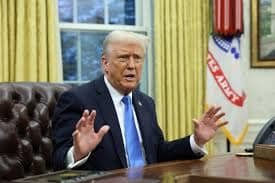Trump on U.S. Debt took center stage in a recent statement that could significantly shape future economic strategy. Former U.S. President Donald Trump asserted that the national debt must be addressed before the creation of a sovereign wealth fund can be pursued. The announcement was made on Thursday and has sparked renewed debate about fiscal responsibility, long-term investments, and the viability of sovereign wealth management in the United States.
Trump on U.S. Debt Endorses a Debt-First Approach
The importance of reducing national debt before undertaking new financial ventures was emphasized by Trump. This stance signals a cautious and fiscally conservative approach to economic planning. It was stressed that unless the ballooning debt of the United States is managed, the feasibility of establishing a sovereign wealth fund would remain questionable.
According to Trump, the United States is already carrying an overwhelming debt burden, which must be prioritized. The idea of launching a sovereign wealth fund had been floated as part of a broader strategy to maximize the nation’s economic influence and invest surplus revenues for future growth. However, it has now been suggested that such plans should be delayed until the financial house is put in order.
Sovereign Wealth Fund Plans Could Be Postponed
While previous comments from Trump had hinted at the possible establishment of a sovereign wealth fund within a year, the recent shift in tone indicates that such a fund might not be created in the near future. Concerns over national debt levels have taken center stage, pushing speculative investments to the background.
Trump’s remarks come amid growing interest in sovereign wealth funds around the world. Countries like Norway, Saudi Arabia, and the United Arab Emirates have used such funds to accumulate national savings, generate returns, and stabilize their economies against global shocks. However, unlike these nations, the United States has not yet ventured into creating a formal sovereign wealth fund at the federal level.
Fiscal Responsibility Has Been Prioritized
The prioritization of fiscal responsibility has been reinforced through Trump’s statement. By putting the spotlight on the national debt, attention has been drawn to the long-standing concerns about government spending, budget deficits, and the growing interest payments required to service the debt. It was noted that the U.S. debt has surpassed $34 trillion, raising alarms among economists and policy analysts.
In Trump’s vision, the creation of a sovereign wealth fund should follow a phase of debt reduction. By taking this approach, long-term sustainability and economic discipline could be ensured. According to experts, the establishment of a wealth fund without first addressing debt might weaken the country’s financial foundation.
Economic Reactions Have Been Mixed
Trump’s comments have been met with mixed reactions from financial analysts and political observers. Some have applauded the focus on reducing debt, arguing that it represents a prudent approach to national finance. Others have suggested that delaying the creation of a sovereign wealth fund could mean missing out on key investment opportunities.
It has been argued that a well-managed sovereign wealth fund could help diversify the nation’s income sources and reduce reliance on traditional revenue streams. Returns from such a fund could potentially be used to fund infrastructure, healthcare, and education, providing long-term benefits for the American people.
Nevertheless, critics have pointed out that a sovereign wealth fund should not be viewed as a replacement for sound fiscal policy. It has been emphasized that debt control, spending reforms, and revenue optimization must go hand in hand with wealth management strategies.
Sovereign Wealth Fund Concept Gains Attention
Despite the delay implied by Trump’s remarks, the concept of a U.S. sovereign wealth fund has continued to gain traction. Discussions about how such a fund would be structured, funded, and managed are ongoing among economists and policymakers.
Some proposals suggest that revenue from energy production, federal land leases, or corporate taxes could be used to capitalize the fund. Governance and transparency have been identified as key concerns, with stakeholders calling for robust oversight mechanisms to prevent misuse or misallocation of resources.
While the debt-first approach has been reaffirmed, interest in the potential of a U.S. sovereign wealth fund has not diminished. It is believed that, in the long term, such a fund could serve as a tool for national savings, fiscal stability, and strategic investments.
Political Implications May Follow
Trump’s renewed focus on debt reduction may also carry political implications. Fiscal discipline has remained a key theme of his platform, and his latest remarks could resonate with conservative voters who prioritize budgetary responsibility. It is possible that this issue will become a major talking point in future campaigns and policy debates.
Furthermore, the idea of a sovereign wealth fund may be used to frame broader discussions about America’s economic future, competitiveness, and role in the global financial system. If implemented wisely, a sovereign wealth fund could enhance national strength without compromising fiscal integrity.
Conclusion
The idea of launching a U.S. sovereign wealth fund has been tempered by Donald Trump’s recent emphasis on national debt reduction. According to the former president, the priority must be to pay off debt before moving forward with wealth fund plans. This statement marks a potential shift in strategy and places renewed focus on fiscal responsibility.
While the path to creating a sovereign wealth fund may be delayed, the concept remains alive and under consideration. As discussions continue, the balance between debt management and long-term investment will likely shape the economic policy agenda for years to come.
